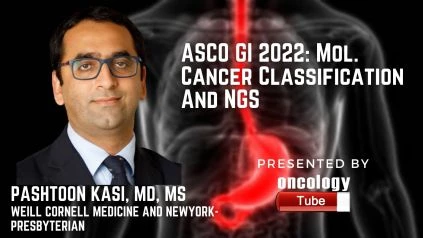Pashtoon Kasi, MD, MS, Director, Colon Cancer Research, Director, Liquid Biopsy Research, Sandra and Edward Meyer Cancer Center at Weill Cornell Medicine, Englander Institute of Precision MedicineClinical Assistant Professor of Internal Medicine – Hematology, Oncology and Blood and Marrow Transplantation from Weill Cornell Medicine and NewYork-Presbyterian Hospital. In this video, he speaks about the ASCO GI 2022 Abstract – Integration of molecular cancer classification and NGS to identify metastatic patients eligible for IDH inhibitors.
Origins:
Isocitrate dehydrogenase 1 and 2 (IDH1 and IDH2) mutations are common in hematologic and solid cancers. Based on enhanced progression-free survival (PFS) and overall survival, ivosidenib was recently approved for IDH1-mutated cholangiocarcinoma (OS). Cholangiocarcinoma is frequently found in tumors with an unknown diagnoses that show as liver metastases. While various trials are presently underway to assess the efficacy of IDH1/2 inhibitors in different advanced solid tumor types, IDH inhibitor therapy currently requires both tumor type identification and IDH mutation confirmation. For metastatic patients with diagnostic ambiguity, the 92-gene assay (CancerTYPE ID) is a gene expression classifier of 50 tumor types and subtypes. Multimodal biomarker testing, which includes next-generation sequencing (NGS), allows for the identification of actionable biomarkers that can be used to guide the selection of targeted therapies. A database of metastatic cases was utilized to identify those who were candidates for IDH inhibitor treatment based on tumor type and biomarker analyses.
Methodologies:
MOSAIC (Molecular Synergy to Advance Individualized Cancer Care) is a de-identified database of cases submitted for CancerTYPE ID testing with tumor type-guided multimodal biomarker testing by NGS, which has been authorized by the IRB (Neogenomics). IDH1/2 mutations were found in metastatic tumors classified as pancreaticobiliary and other solid tumor types in this investigation.
Findings:
In 2377 of 2572 instances, CancerTYPE ID identified 27 different tumor types (92.4 percent ). With 644 cases, the most common tumor type was pancreaticobiliary; subtypes with IDH1/2 mutation status are listed in the table. IDH1 mutations were found in 23 of 78 (29.5%) cholangiocarcinoma cases who were candidates for ivosidenib therapy. Mutations in IDH1/2 were also found in 11 other tumor types. Patients with IDH1 mutations were found in 28.2 percent of tumor forms where there is no FDA-approved IDH treatment, while 50.0 percent of IDH2 mutations were found in tumor types where current trials to establish the clinical value of targeting IDH2 are ongoing.
Outcomes:
These findings back up the clinical value of combining genetic tumor type classification with biomarker analysis to discover authorized and exploratory therapy choices. Based on tumor type and IDH1/2 mutation status, the MOSAIC analysis identified metastatic patients with actionable aberrations (IDH1) who may be eligible for FDA-approved therapy as well as those who may be eligible for investigational IDH inhibitor medicines. As novel and approved IDH inhibitors are examined for efficacy, this technique may allow for increased patient selection in additional tumor types.

